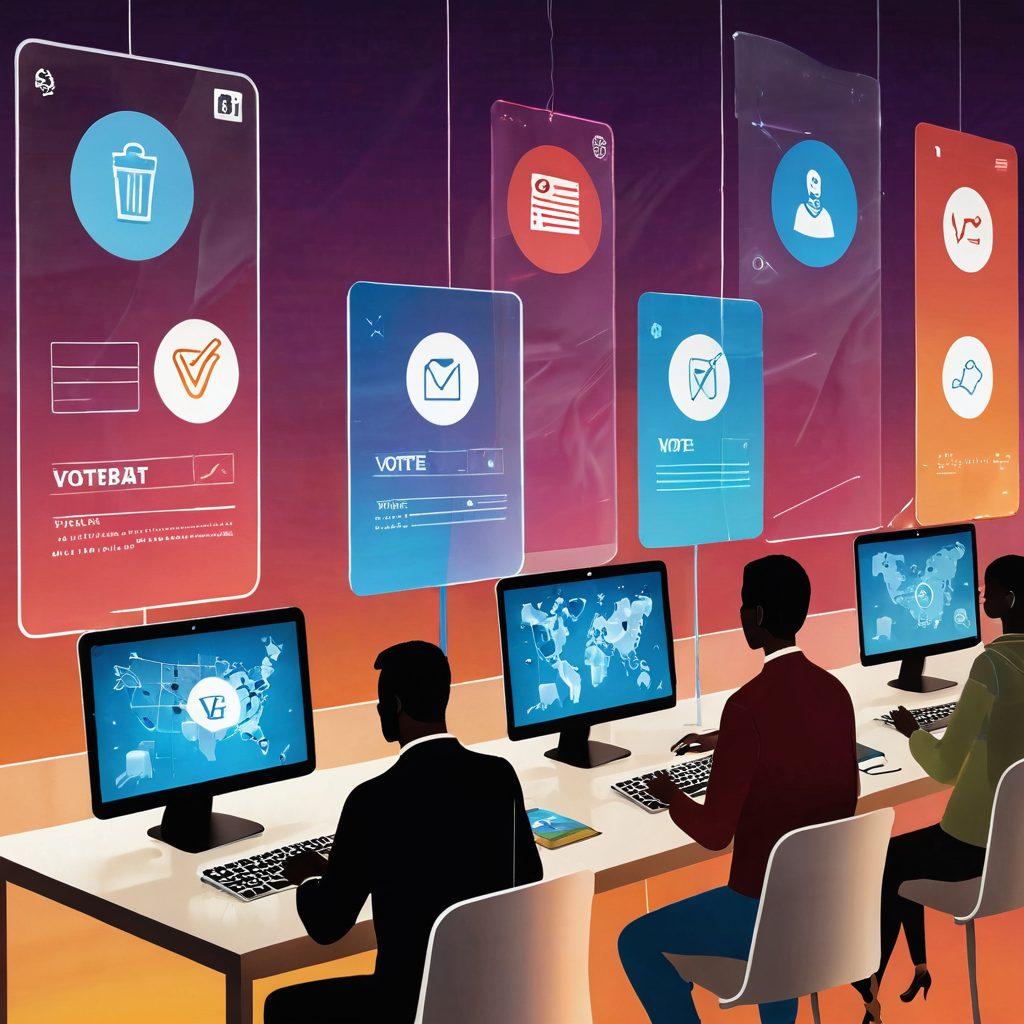Revolutionizing Democracy: The Future of E-Voting and Remote Elections
Imagine a world where casting your vote is as simple as tapping a few buttons on your smartphone. As we stand at the crossroads of technology and democracy, e-voting is revolutionizing the way we view voter accessibility and participation in the electoral process. Gone are the days of waiting in long lines at polling stations; digital voting systems are paving the way for everyone to engage in their civic duties with ease. But what does this new landscape of remote voting really mean for our democracy?
At its core, e-voting seeks to redefine participation by making the act of vote casting more inclusive. This shift towards online polls and electronic balloting opens the floodgates for a more diverse electorate. Think about it: how many voices have been silenced simply due to accessibility challenges? By embracing technologies like mobile voting and secure polling, we’re not just casting votes—we're amplifying voices that have long been unheard. It’s about time we ask: How can we use this technology to ensure every eligible citizen can cast their vote online, without barriers?
Imagine facing a disability that makes going to the polls a daunting task, or being a college student far from your registered voting location. E-voting addresses these painful realities by allowing voters to engage from anywhere, be it their homes or while traveling. A quote rings true in this context: 'Democracy is not a spectator sport.' When we provide accessible tools, we empower individuals to move from spectators to participants—each voice matters in shaping the future of our communities.
Here’s where the conversation gets even more interesting—transparency in elections and election integrity. With the rise of electronic balloting and advanced authentication for voting, how do we ensure that the systems we are putting in place are safe and secure? Voters deserve to know their ballots are counted accurately. As we transition to digital voting systems, oversight and robust polling software become paramount. The question looms: can we achieve a balance between accessibility and security that bolsters voter trust in these unprecedented times?
The future of democracy may very well hinge on our willingness to adapt and embrace innovations like e-voting. As we move towards virtual elections, it's crucial to engage in open dialogues about voter accessibility, security measures, and technological advancements. Together, we must advocate for sturdy ballot management systems and user-friendly voting platforms that cater to all. For those feeling left out, there's a wave of change on the horizon—let's ensure that this time, no vote goes unheard. In the spirit of progress, let's commit to making every election a reflection of the people, both on the ground and online.
Securing the Vote: Innovations in Digital Voting Systems and Election Integrity
In an age where technology has seamlessly woven itself into the fabric of our daily lives, the concept of e-voting is no longer a far-fetched idea reserved for futuristic discussions. Instead, we stand on the brink of a revolution that could redefine the integrity and accessibility of our democratic process. Imagine a world where you can cast your vote online, from the convenience of your couch, at a time that suits you best. As we navigate the innovations in digital voting systems, one burning question rises to the surface: can we truly secure the vote in our journey towards a more connected and participatory democracy?
As we explore the realm of internet voting and remote voting systems, we inevitably come across the pressing need for election integrity. Security is paramount in ensuring that each electronic ballot cast is not only valid but also respected. Advanced authentication for voting is crucial, utilizing biometric data, cryptographic methods, and secure polling applications that protect against fraud. With reliable ballot management systems in place, the transparency in elections becomes less of a concern and more of a guarantee, allowing voters to feel a renewed sense of trust in the electoral process.
Picture this: You’ve just wrapped up a long day at work; the last thing you want is to stand in line at a polling station during a chaotic election day. This is where the power of mobile voting and online polls comes into play, enhancing voter accessibility. The ability to participate in our democratic process without barriers is not just a convenience—it’s a necessity. It opens the door for those who may have physical limitations, are living abroad, or simply have busy schedules. With a simple click, they can engage in virtual elections and ensure their voices are heard, no matter the circumstances.
However, the rise of voting platforms and polling software doesn't come without its challenges. How do we maintain the balance between convenience and security? The responsibility lies with electoral technology developers and lawmakers alike to ensure that these systems not only streamline the vote casting process but also prioritize the protection of voters' data and the accuracy of results. As technology evolves, so too must our strategies to secure and safeguard our democracy, ensuring everyone can participate with confidence in their choice.
In conclusion, the evolution towards e-voting and remote elections can potentially transform our democratic landscape. As we embrace innovations in digital voting systems, the focus must remain steadfast on the core principles of election integrity and security. With each stride toward modernizing our electoral process, we must ask ourselves: Are we prepared to navigate these changes responsibly? As we consider the future of voting in our society, one thing is certain—active voter participation will pave the way for a more inclusive and accountable governance.
The Rise of Remote Elections: Ensuring Transparency and Trust in Virtual Voting
In today's fast-paced digital world, the concept of democracy is experiencing a transformation that could redefine how we view elections. The rise of remote elections and e-voting is paving the way for unprecedented voter participation, enhancing the accessibility of the democratic process. Imagine a future where casting your vote online is as easy as ordering your favorite meal with a tap on your smartphone. With advancements in electoral technology, we are indeed moving toward a future where digital voting systems facilitate transparency and trust in virtual voting, ensuring every voice is heard and accounted for.
Have you ever wondered what it would feel like to vote from the comfort of your home, sitting in your favorite chair, sipping coffee? Remote voting is not just a fantastical idea; it’s quickly becoming a reality. Gone are the days of long lines at polling stations and the anxiety of not making it in time to cast your vote. With secure polling and user-friendly online polls, more people are choosing to participate in elections. This shift does not simply increase convenience—it expands voter accessibility and engagement, allowing more citizens to take part in the political process than ever before.
But with every innovation comes a set of challenges. How can we ensure that the integrity of elections is maintained in a virtual environment? The answer lies in the implementation of robust authentication for voting and secure digital infrastructure. As we explore the potential of mobile voting and electronic balloting, we also confront questions of trust and reliability. What measures will be in place to guarantee that each vote is accurately counted? How do we ensure transparency in elections? The development of reliable polling software and ballot management systems will be vital for building confidence among voters and enhancing the credibility of remote elections.
One of the most exciting aspects of remote elections is their potential to democratize the voting process. Imagine a world where more people could participate without facing logistical challenges or barriers. Digital voting systems can accommodate the needs of those with disabilities, the elderly, and busy professionals who might struggle to get to a physical polling location. When we invite more voices into the conversation, we enhance the richness of our democracy, and everyone has an opportunity to shape the policies that affect their lives. As we embrace this evolution, it will be crucial for governments and organizations to communicate the benefits of voting platforms clearly and effectively to encourage widespread acceptance and participation.
As we look toward the future, it's essential to remain committed to the principles of electoral integrity and transparency. Engaging in conversations about the rise of remote elections and the evolution of e-voting can foster public understanding and promote a culture of participation. Let’s ask ourselves—do we see this as an opportunity or a challenge? With the right safeguards and a commitment to innovation, we can ensure that remote elections can bolster democracy rather than undermine it. So, as this new era unfolds, are you ready to cast your vote online and participate in shaping the future of our society?


